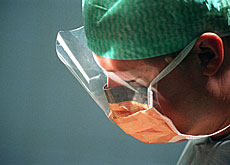Heart centre sets pace in medicine row

The university hospitals of Bern and Basel are joining forces to create a common centre of competence for heart surgery.
Their accord comes amid heated debate over a proposed reform of specialised medicine in Switzerland and against a background of increasing health costs.
Under Switzerland’s federalist structure, cantons enjoy a high degree of autonomy in health matters. The country has one of the best, but also one of the most expensive health systems in the world.
The cantonal health authorities of Bern and Basel said they would cooperate closely in heart surgery and set up a joint centre of competence from next autumn.
They will also seek to coordinate neurosurgery between the two university clinics, a statement said on Friday.
The new heart surgery centre, led by renowned surgeon Thierry Carrel, will be the biggest of its kind in Switzerland and be able to perform about 2,000 operations a year, mostly bypass and valve surgery, but also heart transplants.
The move will ensure high quality of medical care and research as well as help reduce health spending, officials said.
Network strategy
The health director of Basel City, Carlo Conti, said the hospitals were aiming to become the leaders in specialised medicine, without creating a monopoly. Instead Basel and Bern would pursue a network strategy to permit several centres of competence across the country.
“We don’t want Zurich to become the only top-level hospital in Switzerland,” said Bern’s health director Samuel Bhend.
Friday’s announcements are likely to put pressure on the 17 existing heart clinics. The Zurich cantonal authorities in particular have been pushing a proposal to focus top-level medicine at just two sites – one in the German- and one in the French-speaking part of the country.
A spokesman for the Zurich cantonal health department dismissed the latest cooperation between Bern and Basel as inefficient.
One doctor for 266 people
In related health news, it was announced on Friday that the number of medical doctors rose slightly to 28,251 in Switzerland last year.
Latest figures show that 15,313 have a practice and more than 20 per cent of them are general practitioners.
On average there is one doctor for every 266 residents in Switzerland.
Earlier this year GPs in Switzerland took to the streets of the capital Bern to draw attention to growing dissatisfaction over long working hours, pressure to cut health costs and the high amount of administration.
It was the first major protest by members of the medical profession.
swissinfo with agencies
Switzerland’s 26 cantons enjoy a high degree of autonomy in health matters. Its health system is among the best and the most expensive in the world.
The cantons agreed to increase cooperation by 2008 in a bid to limit the number of hospitals offering cutting-edge medicine, including organ transplants, heart surgery and cardiology, and to reduce costs.
Zurich decided last year it would not join the inter-cantonal accord. It wants just two medical centres for the country, while the other cantons have opted for up to six hospitals for specialised medicine.

In compliance with the JTI standards
More: SWI swissinfo.ch certified by the Journalism Trust Initiative










You can find an overview of ongoing debates with our journalists here . Please join us!
If you want to start a conversation about a topic raised in this article or want to report factual errors, email us at english@swissinfo.ch.